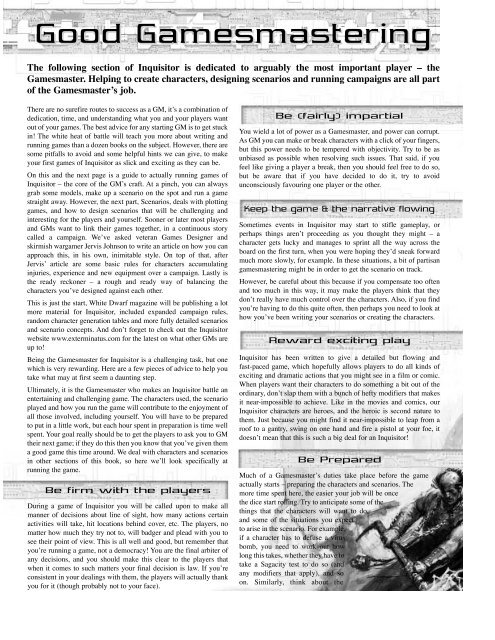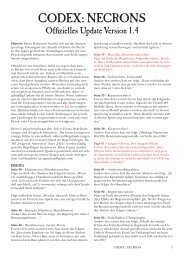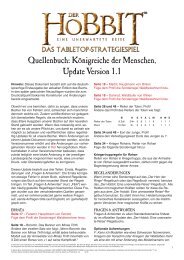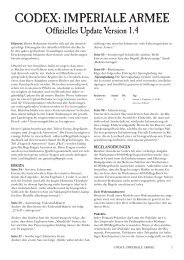Warhammer 40k - Inquisitor - The Living Rule Book 1.1 (Part II).
Warhammer 40k - Inquisitor - The Living Rule Book 1.1 (Part II).
Warhammer 40k - Inquisitor - The Living Rule Book 1.1 (Part II).
Create successful ePaper yourself
Turn your PDF publications into a flip-book with our unique Google optimized e-Paper software.
Good Gamesmastering<br />
<strong>The</strong> following section of <strong>Inquisitor</strong> is dedicated to arguably the most important player – the<br />
Gamesmaster. Helping to create characters, designing scenarios and running campaigns are all part<br />
of the Gamesmaster’s job.<br />
<strong>The</strong>re are no surefire routes to success as a GM, it’s a combination of<br />
dedication, time, and understanding what you and your players want<br />
out of your games. <strong>The</strong> best advice for any starting GM is to get stuck<br />
in! <strong>The</strong> white heat of battle will teach you more about writing and<br />
running games than a dozen books on the subject. However, there are<br />
some pitfalls to avoid and some helpful hints we can give, to make<br />
your first games of <strong>Inquisitor</strong> as slick and exciting as they can be.<br />
On this and the next page is a guide to actually running games of<br />
<strong>Inquisitor</strong> – the core of the GM’s craft. At a pinch, you can always<br />
grab some models, make up a scenario on the spot and run a game<br />
straight away. However, the next part, Scenarios, deals with plotting<br />
games, and how to design scenarios that will be challenging and<br />
interesting for the players and yourself. Sooner or later most players<br />
and GMs want to link their games together, in a continuous story<br />
called a campaign. We’ve asked veteran Games Designer and<br />
skirmish wargamer Jervis Johnson to write an article on how you can<br />
approach this, in his own, inimitable style. On top of that, after<br />
Jervis’ article are some basic rules for characters accumulating<br />
injuries, experience and new equipment over a campaign. Lastly is<br />
the ready reckoner – a rough and ready way of balancing the<br />
characters you’ve designed against each other.<br />
This is just the start, White Dwarf magazine will be publishing a lot<br />
more material for <strong>Inquisitor</strong>, included expanded campaign rules,<br />
random character generation tables and more fully detailed scenarios<br />
and scenario concepts. And don’t forget to check out the <strong>Inquisitor</strong><br />
website www.exterminatus.com for the latest on what other GMs are<br />
up to!<br />
Being the Gamesmaster for <strong>Inquisitor</strong> is a challenging task, but one<br />
which is very rewarding. Here are a few pieces of advice to help you<br />
take what may at first seem a daunting step.<br />
Ultimately, it is the Gamesmaster who makes an <strong>Inquisitor</strong> battle an<br />
entertaining and challenging game. <strong>The</strong> characters used, the scenario<br />
played and how you run the game will contribute to the enjoyment of<br />
all those involved, including yourself. You will have to be prepared<br />
to put in a little work, but each hour spent in preparation is time well<br />
spent. Your goal really should be to get the players to ask you to GM<br />
their next game; if they do this then you know that you’ve given them<br />
a good game this time around. We deal with characters and scenarios<br />
in other sections of this book, so here we’ll look specifically at<br />
running the game.<br />
Be firm with the players<br />
During a game of <strong>Inquisitor</strong> you will be called upon to make all<br />
manner of decisions about line of sight, how many actions certain<br />
activities will take, hit locations behind cover, etc. <strong>The</strong> players, no<br />
matter how much they try not to, will badger and plead with you to<br />
see their point of view. This is all well and good, but remember that<br />
you’re running a game, not a democracy! You are the final arbiter of<br />
any decisions, and you should make this clear to the players that<br />
when it comes to such matters your final decision is law. If you’re<br />
consistent in your dealings with them, the players will actually thank<br />
you for it (though probably not to your face).<br />
Be (fairly) impartial<br />
You wield a lot of power as a Gamesmaster, and power can corrupt.<br />
As GM you can make or break characters with a click of your fingers,<br />
but this power needs to be tempered with objectivity. Try to be as<br />
unbiased as possible when resolving such issues. That said, if you<br />
feel like giving a player a break, then you should feel free to do so,<br />
but be aware that if you have decided to do it, try to avoid<br />
unconsciously favouring one player or the other.<br />
Keep the game & the narrative flowing<br />
Sometimes events in <strong>Inquisitor</strong> may start to stifle gameplay, or<br />
perhaps things aren’t proceeding as you thought they might – a<br />
character gets lucky and manages to sprint all the way across the<br />
board on the first turn, when you were hoping they’d sneak forward<br />
much more slowly, for example. In these situations, a bit of partisan<br />
gamesmastering might be in order to get the scenario on track.<br />
However, be careful about this because if you compensate too often<br />
and too much in this way, it may make the players think that they<br />
don’t really have much control over the characters. Also, if you find<br />
you’re having to do this quite often, then perhaps you need to look at<br />
how you’ve been writing your scenarios or creating the characters.<br />
Reward exciting play<br />
<strong>Inquisitor</strong> has been written to give a detailed but flowing and<br />
fast-paced game, which hopefully allows players to do all kinds of<br />
exciting and dramatic actions that you might see in a film or comic.<br />
When players want their characters to do something a bit out of the<br />
ordinary, don’t slap them with a bunch of hefty modifiers that makes<br />
it near-impossible to achieve. Like in the movies and comics, our<br />
<strong>Inquisitor</strong> characters are heroes, and the heroic is second nature to<br />
them. Just because you might find it near-impossible to leap from a<br />
roof to a gantry, swing on one hand and fire a pistol at your foe, it<br />
doesn’t mean that this is such a big deal for an <strong>Inquisitor</strong>!<br />
Be Prepared<br />
Much of a Gamesmaster’s duties take place before the game<br />
actually starts – preparing the characters and scenarios. <strong>The</strong><br />
more time spent here, the easier your job will be once<br />
the dice start rolling. Try to anticipate some of the<br />
things that the characters will want to do,<br />
and some of the situations you expect<br />
to arise in the scenario. For example,<br />
if a character has to defuse a virus<br />
bomb, you need to work out how<br />
long this takes, whether they have to<br />
take a Sagacity test to do so (and<br />
any modifiers that apply), and so<br />
on. Similarly, think about the

















